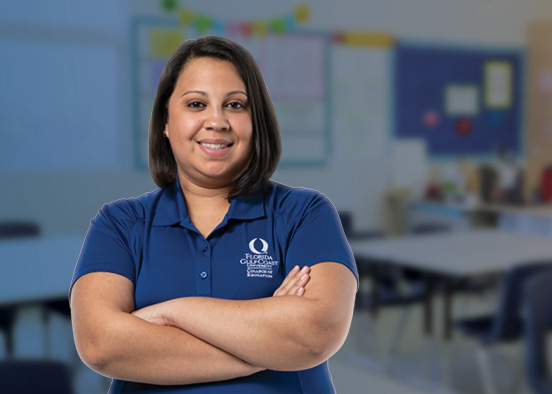
At the risk of stating the obvious, teaching is a challenging profession. The contributions made by those charged with educating and inspiring our children cannot be overstated. And now, as a result of the pandemic, the additional demands on our teachers have become epic in size.
Along with healthcare workers and community advocates, mental health counselors and scientists, engineers and entrepreneurs — they are part of a legion of ordinary people who became extraordinary in challenging times and demonstrated the impact of FGCU in communities near and far.
COVID-19 simply appeared. Everywhere. No warning. No rules of engagement. COVID-19 demands of us courage, perseverance, self-sacrifice and action. COVID-19 demands we dig deep, be smart and respond with patience, empathy and compassion.
Student teacher Carolyn Cordova, (’22, Special Education), knows only too well the importance of patience, empathy and compassion, having struggled with a learning disability her entire life. “High school failed me. Didn’t prepare me for the real world. I was labeled and set aside. Scared. Treated differently.” She credits her parents as being the greatest inspiration in her life. “They fought for me, didn’t take no for an answer. Always came to my defense. They were always there for me.”
She also credits FGCU’s Adaptive Services staff as more than accommodating. “The people are absolutely amazing. If I need something – anything – they are always there to help.”
While pursuing her degree at FGCU, Cordova works as a full-time student teacher at Meadow Park Elementary School in Charlotte County. Her personal experience was, not surprisingly, a huge factor in her decision to major in special education and help other students gain the confidence to overcome any obstacles put in their path.
Cordova works with fourth- and fifth-graders struggling with emotional behavior disorders. When lockdown was lifted and students returned to the classroom, life as they had known it was different. They were challenged with learning new rules; Cordova was challenged with gently guiding her students to accept and live in their new world. For starters, the classroom looked different with all the desks spaced apart. For students who prefer routine, this alone was disconcerting.
“When the students first came back to school, there were a lot of rules that they didn’t have before,” said Cordova. “They had been online for so long it was important to get them into a classroom routine.”
It was critically important for students to learn the expectations of their behavior in the classroom: wearing masks, maintaining social distance and washing hands.
Cordova said her students were “really amazing when it came to wearing masks. Much better than adults.” Nevertheless, the masks did present another challenge, one that produced much frustration for students, she said. “We couldn’t hear them, and they couldn’t hear us.” That is where patience proved valuable.
“I believe my personal experience is invaluable when it comes to working with my students,” she said. “Take reading as an example. Many students have great difficulty. But I say, ‘Let me tell you a secret. I had trouble reading, too, when I was younger.’ I was in their shoes once.” That knowledge proved encouraging for her students.
And that is where empathy and compassion come in.
In her own life, Cordova said, “I learned to accept who I am. I learned to advocate for myself, to accept my disability, because I knew if I didn’t that life would be harder.” This is one of the major lessons she hopes to instill in her students.
Cordova said she does not sense fear in her students, regardless of the pandemic, though they understand there is danger associated with the virus. “They’re more fearful for their teachers. Cautious. They understand that masks keep everyone safe. And so, they wear them willingly.”
When asked what she thinks her students have learned through dealing with the pandemic, Cordova is clear: “Students think much more about who is around them. They are more empathic. The pandemic has taught the children to think about one another in a different way.” [/vc_column_text][vc_column_text]
SUPPORT THE FRONTLINES
This is part of a series of stories spotlighting FGCU students, faculty and alumni making an impact during the pandemic.
 By investing in a scholarship or a program at FGCU, you can empower more individuals like them to make a difference where it matters most — on the frontlines. For information on how you can help, call FGCU Advancement at 239-590-1067, or visit FGCU on the Frontlines to see more stories and give online.[/vc_column_text]
By investing in a scholarship or a program at FGCU, you can empower more individuals like them to make a difference where it matters most — on the frontlines. For information on how you can help, call FGCU Advancement at 239-590-1067, or visit FGCU on the Frontlines to see more stories and give online.[/vc_column_text]